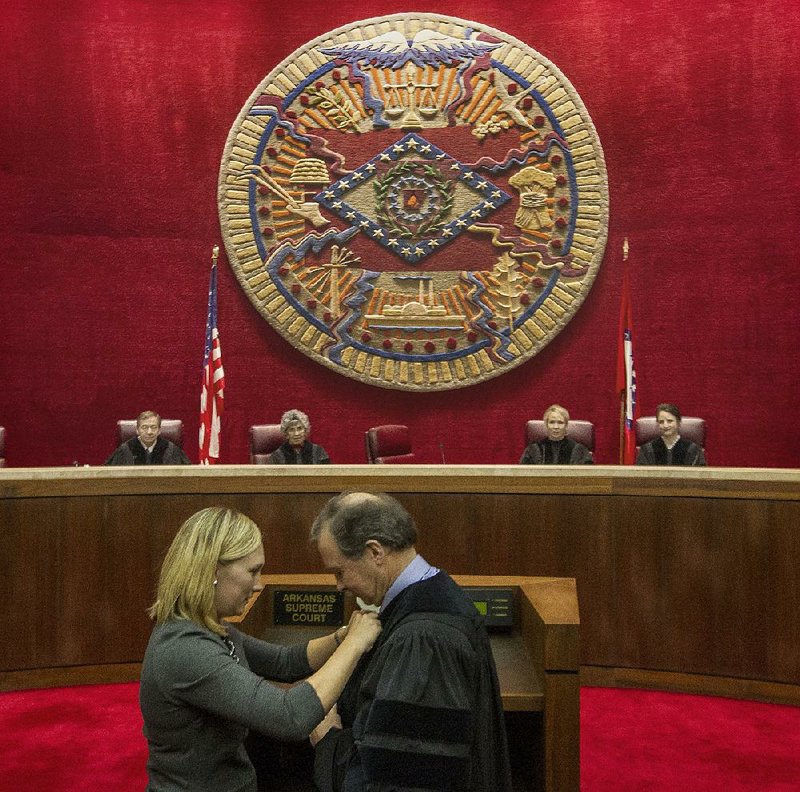LITTLE ROCK — The Arkansas Supreme Court on Thursday cleared the way for the state to launch its medical marijuana program, reversing and dismissing a judge's ruling that prevented officials from issuing the first license for businesses to grow the drug.
Pulaski County Circuit Judge Wendell Griffen ruled in March that the state's process for awarding medical marijuana cultivation licenses was unconstitutional. He said the process violated the 2016 voter-approved constitutional amendment that legalized marijuana for patients with certain conditions in Arkansas.
Griffen's order prevented the state's Medical Marijuana Commission from awarding cultivation licenses to five businesses it had identified as the top scoring firms among 95 applicants that sought the permits.
The Supreme Court ruled Thursday that Griffen did not have jurisdiction to halt the licenses. In the ruling, the court said the Arkansas Constitution prevents one branch of government from exercising another branch's power.
Writing for the majority, Justice Rhonda Wood said that the Arkansas Constitution prohibits one branch of government from exerting powers belonging to another branch.
"The judicial branch must not abdicate this by reviewing the day-to-day actions of the executive branch,” Wood wrote.
Chief Justice Dan Kemp wrote a separate concurring opinion.
Latest medical marijuana headlines
The Arkansas Medical Marijuana Commission won’t take any action on cannabis growing licenses for at least two weeks — the time it takes for a Supreme Court order to become final.
“At that point the Medical Marijuana Commission, with the ability to continue any action that was underway or scheduled prior to the injunction, will announce the next steps in this process,” said Scott Hardin, a spokesman for the state Department of Finance and Administration, which provides administrative support to the commission.
Gov. Asa Hutchinson, a Republican who had opposed the medical marijuana amendment, said he was pleased with the court's ruling.
"The justices have not only expedited this case in the public interest but also recognized the limited role of the judiciary in reviewing discretionary decisions made by an executive branch agency," Hutchinson said in a statement.
The ruling stemmed from a lawsuit filed by an unsuccessful applicant that argued the process for awarding the licenses was flawed. The company, Naturalis Health, cited two potential conflicts of interest by members of the commission. Attorneys for Naturalis did not immediately return messages Thursday morning.
The company also claimed officials did not verify applicants' assertions that their facilities would be the required distance from churches, schools and day cares. Naturalis ranked 38th out of the 95 applications submitted, officials have said.
However, attorneys for the state and the companies set to receive the licenses argued that Griffen's court didn't have jurisdiction to hear Naturalis' complaint.
Keith Billingsley, an attorney for Naturalis, said he was talking with the company about what steps they wanted to take in response to Thursday's ruling.
"We believe there was ample evidence as set forth in our briefs and as discussed with Judge Griffen to determine that the court has jurisdiction to do what it did," Billingsley said.
Griffen's ruling effectively halted the launch of Arkansas' medical marijuana program. State officials in April announced the commission would stop reviewing applications for dispensaries to sell medical marijuana in response to Griffen's ruling. Arkansas has approved more than 5,300 applications for patients to use medical marijuana and will issue registry cards about a month before the drug is expected to be legally available.
The court's ruling did not mention a letter the attorney general's office filed with the court detailing a commissioner's claim that he was offered a bribe by another unsuccessful applicant but did not accept it. The letter, which was unsealed hours after justices heard the case over the halted licenses, said the bribery allegation remained unsubstantiated and was being investigated by law enforcement.
Read Friday's Arkansas Democrat-Gazette for full details.
Arkansas Democrat-Gazette reporters John Moritz and Hunter Field contributed to this story.
